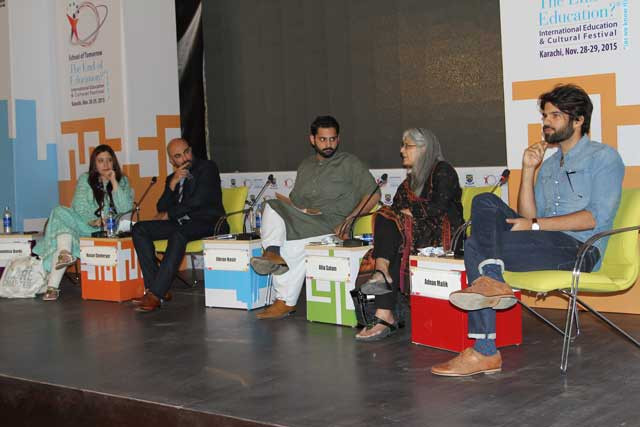Age of surveillance: Be yourself, just not on social media
Speakers discuss the possible repercussions of the strict monitoring by the authorities

PHOTO: AYSHA SALEEM/ EXPRESS
The lines from George Orwell's 1984 resonate with the environment of surveillance and monitoring we are exposed to today. In such a scenario, the question of privacy becomes of fundamental importance. The concerns were discussed on the second day Beaconhouse School System's School of Tomorrow session titled "Is Privacy no more a Social Norm?" The session was moderated by Zebunnisa Burki.
Striving for harmony: Education as a tool for peace building
"Children and adults need to realise that no matter what they might put up on social media, be it restricted or private, but nothing goes away from the internet," said journalist Afia Salam. "The authorities will invade your private space and store the data."
The National Action Plan policing your communication links and different other policies bear testament to the surveillance of the population, she added.
When authorities are involved then a person's privacy can be easily infringed as it is a concern of national sovereignty, said social activist Jibran Nasir.
"The cybercrime bill if passed will make all your information accessible to the authorities," said Salam. It will be very easy for the establishment to prove someone to be a 'traitor' and thrash their public image, she claimed. "Social media is an evil presence lurking over our shoulders."
As a society, we indulge into the lives of others, we want to know their class, religion and caste, said Nasir. Even at work place, we constantly want to know the pay of our colleagues, he claimed. This could be linked to the Hudood Ordinance, as it provided authorities the right to invade the privacy of women, he added.
Public figures
The time when public figures were seen as inaccessible has passed, as people are a lot more involved now, said actor and filmmaker Adnan Malik. "Where do you draw the line?"
Commenting on the recent backlash experienced by Bollywood actor Amir Khan, Salam said that he made a comment about his wife but the response was unprecedented. "How do we control this?"
In reference to a famous political divorce, Nisar spoke about how the people did not respect the privacy of the public figures. "If a person tweets about his marriage, he expects his fans or followers to be happy for him, rather than making snide remarks on his marriage. That is quite disrespectful."
Talking it out: Pakistan’s fear of expressing itself
"You have to be careful to not expose yourself and protect your own self," said fashion designer Hasan Sheheryar Yasin.
"We need to realise that nothing is truly private anymore," said Malik, concluding the session.


















COMMENTS
Comments are moderated and generally will be posted if they are on-topic and not abusive.
For more information, please see our Comments FAQ